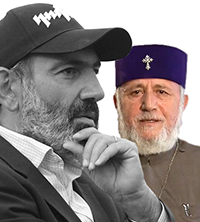
Since 1991, the Armenian Apostolic Church has purposefully expanded its presence in public and state life, but the issue of its role and place remains a topic of heated discussions two decades after the declaration of independence.
If during the Soviet Atheistic period, the majority of the public did not cast doubt on the historical but also on the exceptional role of the church in the history of the Armenian people, today, when the claim has been introduced in the Constitution, the number of those who are skeptical of the church increases. Its role during the history is also being reassessed.
There is a gap between the society and the church, which is expressed in the media and especially in social networks, sometimes with extreme criticisms and crude attitudes towards the church and its clergy.
We think the reason is that the church has no conceptual approach to the “church-state” and “church-society” relationship that is consistent with the current situation.
To counteract criticism in any way, the Mother See tries to play its previous theses and templates typical of the Middle Eastern stateless religious unions, trying to satisfy the vanity inherent in small nations with many complexes and to take on a non-specific role in public societies:
The times have changed, and even the Echmiadzin’s monks have begun to feel, but the reform can not be limited to external manifestations. To admit to the status of a “national church” means to comply with the political situation and, most importantly, to be up-to-date and to respond to the demands of the society.
The main axis of the public discourse in the country’s political and social life is conversation on injustice, electoral frauds, social injustice, distrust of the judiciary and justice in general, and so on. Under these conditions, the church elite has begun to be viewed as a public servant of a non-legitimate system in public discourse. Christianity is considered to be a living church, which means to be up-to-date and to look for answers to the questions of concern at the moment, even from the point of view of its inherent salvation. Some high-ranking clergymen are among the main heroes of corruption scandals, who appear in the center of criticism, nevertheless continue to hold office. It also contributes to the fact that the church budget is closed to its followers, which is why there is public distrust towards the church elite. The church receives tax privileges from the state and has already become a major taxpayer and owner of a large property, but the fact that the church budget and financial activity are not transparent is, in turn, a rich subsidy for public doubts.
The other most important issue is the attitude towards religious freedom. One of the fundamental provisions of the Armenian constitution and legislation is the principle of freedom of conscience, but in the public rhetoric of the clergy this principle is criticized. Moreover, religious freedoms are condemned and presented as an anti-national provision that creates a serious problem in public perceptions of constitutionalism and legitimacy.
Openly speaking against religious freedoms, the Church tries to expel other religious organizations from the law, qualifying them as “sect” and anti-national structures.
One of the main issues is the identification of national and religious belonging, one of the molds of the Miletian past, and the main thesis of the Armenian Church propaganda.
Thus, the Church has to harmonize its positions with the Constitution of Armenia.
a) Refuse the national and religious identification provisions;
b) Formulate the official attitude of the church on the right to religious freedom that complies with the Constitution of Armenia and the international obligations assumed by Armenia;
c) Start a dialogue with other Armenian communities of other religions, tribes and conventions to form an atmosphere of inter-national solidarity and mutual assistance;
d) Prepare its social conception clearly expressing the Church’s viewpoints on social justice, property rights, family, lone mothers and other key issues of the public agenda;
e) Establish the rules of church-state cooperation;
f) Publish and present to his followers the church budget, annual expenses, listings of property and assets, business entities, church bank accounts and donations reports.
And most importantly, it is necessary to clarify its doctrine, though it is a separate topic for discussion.